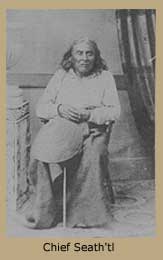 |

Basic Call to Consciousness

Intention

Invented White
History & Imagery

In the Beginning

First Nations Governance

Trail of Tears

Tragedy of
Little Bighorn

Massacre at
Wounded Knee

Duwamish/Suquamish
Displacement

Cultural Genocide

Native Values

Impact of European Immigrants

The Take-over

Called ‘Indian’ or....

Cultural Genocide - Boarding schools

Native Values &
Way of Life

Morality

Depression &
Substance abuse

Cultural Distinctions

Spiritual Sensibilities

Language

Living Two Lives

Leaders or Rulers

Written or Oral

Painful History

Iroquois Conservation

Chief Seattle’s
Farewell Speech

Spirit Road

|
 |

Chief Seattle's Farewell Speech
Chief Seath’tl addressed Gov. Stevens in 1854 - delivering a haunting farewell speech that has come to be recognized as one of history’s great pieces of Native American oratory:
|
“My people are few. They resemble the scattering trees of a storm-swept plain...There was a time when our people covered the land as the waves of a wind-ruffled sea cover its shell-paved floor, but that times long since passed away with the greatness of tribes that are now but a mournful memory...

“To us the ashes of our ancestors are sacred and their resting place is hallowed ground. You wander far from the graves of your ancestors and seemingly without regret. Your religion was written on tables of stone by the iron finger of an angry God lest you might forget it....Our religion is the traditions of our ancestors--the dreams of our old men, given them by the Great Spirit; and the visions of our Sachems (council members), and is written in the hearts of our people....

“Every part of this country is sacred to my people. Every hillside, every valley, every plain and grove has been hallowed by some fond memory or some sad experience of my tribe. Even the rocks, which seem to lie dumb as they swelter in the sun along the silent shore in solemn grandeur thrill with memories of past events connected with the fate of my people, the very dust under your feet responds more lovingly to our footsteps than to yours, because it is the ashes of our ancestors, and our bare feet are conscious of the sympathetic touch, for the soil is rich with the life of our kindred.

 “And when the last Red Man shall have perished, and his MEMORY among white men shall have become a MYTH, these shores will swarm with the invisible dead of my tribe and when your children’s children shall think themselves alone in the field, the store, the shop, upon highway, or in the silence of the woods, they will not be alone. In all the earth there is no place dedicated to solitude.
“And when the last Red Man shall have perished, and his MEMORY among white men shall have become a MYTH, these shores will swarm with the invisible dead of my tribe and when your children’s children shall think themselves alone in the field, the store, the shop, upon highway, or in the silence of the woods, they will not be alone. In all the earth there is no place dedicated to solitude.

At night when the streets of your cities and villages shall be silent and you think them deserted, they will throng with the returning hosts that once filled and still love this Beautiful land.

The White Man will never be alone. Let him be just and deal kindly with my people, for the dead are not powerless.”
|
To support the Duwamish Tribe in building the Duwamish Longhouse and Cultural Center, visit their website: https://www.duwamishtribe.org/
Northwest Coastal Native Art
Vision of the Spirit Road for Today
Bruchac speaks of the Circle - “...to the return of some of the traditional ways of First Nations People, rediscovering the timeless truths in their age-old stories--that each one of us changes our world with baby-steps by acting upon the truths in these stories.”

He tells a Lakota story about Great Spirit’s search for the best location for the Seventh Direction - the most powerful Direction, as it contains the true Knowledge of the Spirit. “Great Spirit did not wish for this Direction to be too easily found by the humans. Great Spirit decides to hide this final Direction in a place that would be difficult for human beings to look. As the story goes, Great Spirit solicits the help of the Animal People because they are wise Beings. An Animal Being had an idea of an excellent location to hide this Direction: in every person’s heart--the Animal Being knew this would be the best hiding place of all-for one of the hardest things a human can do is to look into her or his own heart.”

 Lame Deer concurs, in his book, Seeker of Visions: “We Indians hold the sacred pipe of peace, but the white man’s religious book speaks of war, and we have stood by while the white man supposedly improved the world. Now we Indians must show how to live with our brothers and sisters, not use them, kill them or maim them. With the sacred pipe, which is a living part of us, we shall be praying for peace [overseas] and in our own country. We Indians say “our country” because it is still ours even if all other races are now in physical possession of it, for land does not belong to any single man, but to all people and to the future generations.
Lame Deer concurs, in his book, Seeker of Visions: “We Indians hold the sacred pipe of peace, but the white man’s religious book speaks of war, and we have stood by while the white man supposedly improved the world. Now we Indians must show how to live with our brothers and sisters, not use them, kill them or maim them. With the sacred pipe, which is a living part of us, we shall be praying for peace [overseas] and in our own country. We Indians say “our country” because it is still ours even if all other races are now in physical possession of it, for land does not belong to any single man, but to all people and to the future generations.

“We must try to use the pipe for humankind, which is on the road to self-destruction. We must try to get back on the red road of the sacred peace pipe, the road of life. We must try to save the white man from himself.

This can only be done if all of us, Indians and non-Indians, alike, can see ourselves a part of this earth, not as an enemy from the outside who tries to impose its will on it. Because we, who know the meaning of the pipe, also know that, being a living part of the earth, we cannot harm any part of her without hurting ourselves. Maybe through this sacred pipe we can teach each other to see through that cloud of pollution which politicians and corporate power hold up to us as “reality”. Through this pipe, maybe we can make peace with our greatest enemy who dwells deep within ourselves. With this sacred pipe we could all form, once again, the circle without end.”

The enemy is blindness to each other’s ways. Put your anger away, the
spirits said. Our earth is crying now, and we need to remove her tears.

Favorite Links:
Native
American Indians
A child friendly site about Canadian and American Indians. 1400+
legends, 400+ agreements and
treaties, 10,000+ pictures, free clipart, Pueblo pottery, American Indian
jewelry, wolf tee shirts
and more.
Click on the rug to return to the top of the page.

 Home Home
 Quiz Quiz
 About Author About Author

|
![]() ©2015 Lilthea Designs
©2015 Lilthea Designs